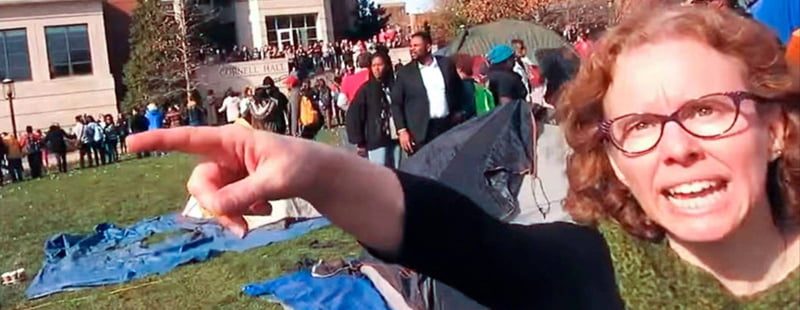We support the controversial firing of Melissa Click for many reasons. And, ironically, on the same day this post was scheduled to go live (today, March 15, 2016), the University of Missouri’s Board of Curators rejected an appeal filed by Click, thereby upholding her termination.
As the owner and managing consultant for Chemistry Multimedia, a communication consulting firm with an emphasis on Crisis Communication, I want to point out that there were a number of ways Click could have averted her fate and toned down the heated controversy surrounding herself. She could have actively and accurately used Crisis Communication tactics to create a different outcome.
To give adequate background, Melissa Click’s employment as a University of Missouri professor was terminated by the school’s Board of Curators in a 4-1 vote on February 23, 2016 after several months of controversy.
That controversy started when Click was caught on camera November 9th at a student protest where she asked for ‘muscle’ to forcibly remove Mark Schierbecker, the videographer that broke through the student’s circle of protest line.
On this same day, tensions and outrage were boiling over regarding several weeks of protests on race relations in which African American students protested their claims of systematic racism on campus. As a result of a series of closed-door meetings and multiple protests, the University of Missouri Board of Curators ultimately accepted the resignation of the University of Missouri Chancellor, Tim Wolfe. The day of Wolfe’s resignation was the same day of the Melissa Click incident, November 9th.
With the above stated, a video of Melissa Click went viral depicting Click bullying student reporters with her blatant disregard for the freedom of press, and calling for violence against those student reporters. As a University of Missouri communications professor affiliated with the nationally renowned Journalism department of the University of Missouri, this act of protest was seen worldwide as a disgrace and it has inadvertently blemished the credibility of the Journalism Department at the University.
In mid-February, 2016, months after the MU incident, Click decided to make a couple attempts to apologize for her actions by explaining her actions (CBS This Morning and Fox 2 in St. Louis). These interviews occurred *AFTER* a Columbia Police Department video was released showing Click attacking local police officers. The problem with Click’s apologetic responses is that she was trying to explain reasons why she did what she did.
As a University of Missouri (St. Louis) Communications alum, and a Public Relations Professional for over 20 years, I’ve dealt with my share of crisis situations. While I hesitated writing this blog on my company page for political reasons, I was compelled to do so professionally because there are clues as to how Melissa Click could have used Crisis Communications tactics to thwart her firing by the Board of Curators.
I submit the following proactive actions Click could have taken to mitigate actions taken against her:
1) Respond and Take Action Immediately
My research indicates that the first public interviews that Click conducted were done on February 10th; a full 3 months after her verbal attack on the student reporter went viral. These interviews with media took place as a last ditch effort to save her job while her fate was being determined by the Board of Curators.
While handling crisis communication in reaction to incidents like this, one cannot be silent! Taking action immediately i.e., a sincere apology, should have occurred within 2 days to 1 week after the videos went viral. Crisis Communication firms like Chemistry Multimedia scripts answers and works with clients in much the same way a lawyer would prep a witness, while formulating those answers to help sway public opinion.
Obviously, the sooner one gets in front of a story and steers the dialog, the more effectively you then control the conversation. In this case, Melissa Click could have proactively defended herself by apologizing. Had this happened, it is very likely that the second set of videos would not have been leaked. That second set of videos were shot by police body cameras at a different protest where Click was seen verbally assaulting Columbia police officers.
It was astounding that even after Click was charged with a 3rd Degree Assault charge and sentenced to 20 hours of community service, she still did not make a public statement. Therefore, the narrative is that of her opponents which continued to grow after said court hearings.
2) Be Open and honest
It is vitally important that anyone facing accusations in a crisis situation come across in a manor that’s open, honest and transparent as to the reasons for their actions. When responding to accusations and calls for resignation, Click tried to explain that she she was abrasive with media because the police were nowhere to be found on the Mizzou campus. However, because her statements potentially misrepresented the situation, the Columbia police department searched through presumably thousands of hours of police body camera footage to find police interacting with Click. This again portrayed Click as being less than honest with her accusations.
3) Address the Critics Head On
It appears that Click had no strategy in place to address her critics. Because of the attacks, it appeared that Click went into hiding therefore not responding to any of the criticism alleged against her. If Chemistry Multimedia would have been representing Click, she would have advised to hold a press conference immediately after the accusations manifested, thereby quelling the reactions of her critics, her university, her department and the students of the university.
4) Apologize
Apologies go a long way if they are sincere and meaningful. If done effectively, after a public apology, many of the critics may have ceased with their attacks on Click. As stated above, we believe that if Click had held a press conference within one week of the vent going viral, thoroughly condemning her actions as wrong, and then sincerely apologizing to the university, her departments and the students, as well as her critics, there is a high probability that this entire crisis could have been over in November without any threat of Click being terminated.
5) Turn a negative situation into a positive one
It is our contention that if Click would have conducted a timely press conference where she apologized, constructively addressed her critics and was honest and open, she would have had the chance to reframe the conversation. She could have stated that she has learned a great deal through this experience, and, as a learning institution, she will use this experience to help others at the University of Missouri
As a public relations professional for over 20 years, I strongly believe that if Melissa Click would have followed the above five steps, she would still be a professor at the University of Missouri. If put in a similar situation, I would always advise hiring a firm like ours to help guide and implement communications strategies. Favorable outcome depends upon making the correct decision quickly.
For more information or to reach out to Chemistry Multimedia, please email Chris Kuban at chris@ChemistryMultimedia.com or call 314-603-2866.
NOTE: As of late last week, Click was still in the news fighting or her job. We contend this should have been done 3 months earlier because now it is to late!



